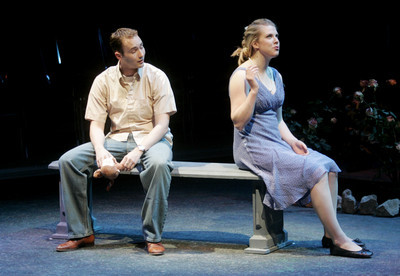Unlock the Wedlock
Love is a temporary insanity, curable by marriage." -- Ambrose Bierce
Cynics make rotten romantics.
But if Bierce couldn't score a staff gig at Hallmark, he'd nail a position as a playwright's muse.
"You never know if you're going to be happy with the person you're with," says Laura Turner, the postgraduate author of "Take Me to Monaco," closing the Playwrights Festival this weekend at the University of Nevada, Las Vegas.
Marriage -- its delicious anticipation for some, its bitter aftertaste for others -- anchors the seriocomic "Monaco," in which a mother goes into meltdown mode at her daughter's nups, convinced that the marital misery of her past predicts the matrimonial future of her child. In other words: Drop the Bible, reverend, and step away from the couple.
"The mother's whole thing is, 'You never know, so it shouldn't happen,' " Turner says. "The daughter's whole thing is, 'I hope I will be happy with him, and that's all I can say now.' "
"Marriage is the triumph of imagination over intelligence." -- Oscar Wilde
Bossy, neurotic and exposing her raw psychological scar tissue while shouting doom-and-groom proclamations to her daughter and hopefully-never-son-in-law, Momma's a sympathetic whack job. Guiding the character, named Candice, onto those parallel tracks is her portrayer's daunting dilemma.
"It's very physical and takes a lot of energy," says Elisabeth Bokhoven, pitching her performance just short of hysterical, yet still hilarious at a recent run-through. "There are a lot of traps with her. You can really get into playing her kind of crazy, like she's trying to kill herself throughout the whole play. I'm trying to make it so you understand where she's coming from."
"You married her, you didn't hire her." -- Dr. Phil to a controlling husband
In the opening act of "Take Me to Monaco" (the title bespeaks Momma's dreams of escape to the cozy French nirvana) they're prepping the knot-tying when Candice gives a rose to daughter Sarah, who slices her hand on the thorns as blood -- and perhaps a darkly symbolic omen -- seeps onto her dress. When Sarah slips into her mom's old wedding ensemble instead, it's an omen-squared.
"When she comes in wearing the dress, the mother freaks out," Turner says. "She just makes a mockery of their wedding and everyone leaves."
"If you want to sacrifice the admiration of many men for the criticism of one, go ahead, get married." -- Katharine Hepburn
In the nonwedding's wake, Turner shifts focus to the family fallout, a round-robin of recriminations from mother-daughter resentments to Sarah's threats of a Vegas elopement to Candice's face-offs with her ex-sister-in-law, an overbearing reverend who vilifies Candice over the collapse of her brother's marriage. There's even an ersatz exorcism when Candice's emotional meter pole-vaults into the red zone.
"I've also threaded some flashbacks to help the audience figure her out," Turner says. "Because she does these crazy things in the beginning of the play, the audience might disconnect from her, so I give them a look into her mind. She had a pretty unhappy marriage that ended badly, and you find out what happened in the second act, which is a big reveal."
"For a marriage to have any chance, every day at least six things should remain unsaid." -- Anonymous
"I'd like the audience to think about what it means to lose control and how to continue on and accept change in one's life," Turner says. "I was trying to get away from this as just a play about a mother who ruins her daughter's wedding. I didn't want it to be 'Monster-in-Law.' "
Bokhoven is mindful to modulate Candice's escalating fury, particularly during more grandiose outbursts -- wedding gifts, and even a rock-loaded suitcase (we'll leave it to the play to explain that one) are flung around as she flies into fits.
"The quieter scenes with the ex-husband, I could really get into talking and listening, but those other scenes were tougher," Bokhoven says. "I wanted to play them really big, and that can get out of hand. The director and the playwright and I have been working to keep those moments honest and truthful."
If Candice resorts to base behavior, well, doesn't marriage have a habit of stripping sophisticated relationships down to the simplest human instincts? Apologies to Ambrose Bierce, but the last word more fittingly goes to the classic literature of Edgar Rice Burroughs:
"Me Tarzan, you Jane."
Contact reporter Steve Bornfeld at sbornfeld@reviewjournal.com or (702) 383-0256.
what: "Take Me to Monaco" when: 8 p.m. today and Saturday, 2 p.m. Saturday and Sunday where: Black Box Theatre, University of Nevada, Las Vegas, 4505 S. Maryland Parkway tickets: $12 (895-2787)















